How A Vet Visit Went Terribly Wrong: Princess’ Story
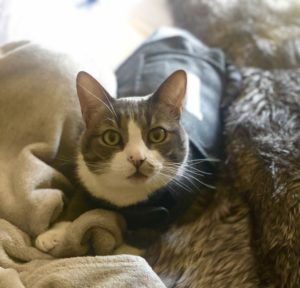
Princess
It’s not a big surprise to me why cat parents hate taking their cats for a vet visit. Our precious kitties love routine, and anything that disrupts this can be quite upsetting. I’m sure our cats enjoy going to the vet as much as we enjoy going to the dentist. No thank you! Nevertheless, it remains important for cats to at least get an annual wellness check up. I’ll share recommendations for ways to feel empowered at your cat’s next trip to the vet as well as a client’s personal testimonial below.
Study shows vet visits have decreased for cats
There was a study done by Bayer and the American Association of Feline Practitioners (AAFP) to “learn why cat visits to the veterinarian have been declining over the years.”
Through the survey, researchers found that 52 percent of cats in the U.S. had not been taken to the veterinarian in the past year for necessary checkups. They also found that only half as many cats receive annual exams as dogs.These disheartening numbers are largely due to cat owners anticipating unpleasant experiences while taking their cats to the veterinary clinic, the survey reportedly showed, as 58 percent of cat owners said they believe their cat hates visiting the veterinarian. Thirty-eight percent of cat owners also said they get stressed out at the thought of veterinary visits.
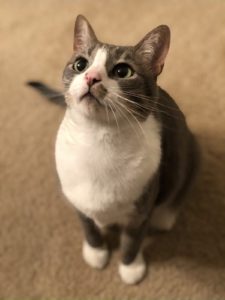
Princess
Princess’ vet visit disaster
Due to COVID, we aren’t allowed to go indoors, so the parents have to wait in their cars, making it a little more difficult to discuss issues with a feeling of urgency as you see other patients drive up and stay in their cars as well. I showed the vet a video of princess hissing in thin air and stomping on her tail while growling. After a physical exam (no blood samples or any x-rays were recommended), the vet said she looked fine. She suggested using an Advantage Multi-Single Dose and getting her yearly Purevax Rabies shot and an FVRCP Booster. She also recommended trying Feliway diffusers, and if that didn’t help, I could go back, and we could talk about starting her on Gabapentin or Fluoxetine. Still, she wanted to avoid medicating her if possible.
Princess was acting great when we got home, but four hours later, I saw a different cat. Her FHS symptoms were heightened. She was becoming aggressive, which she never was before. When I would try to hold her, she would growl and act as if she could attack, which she never did before when displaying FHS symptoms. From my own research, I have diagnosed her with FHS because my cat was never like this before.
When you’re medically held hostage when visiting the vet…
I typically never took her to the vet, only when there was a cause of concern. She doesn’t get vaccinated every year, although last August of 2019, she had to get a couple of teeth pulled out. I initially took her in because she had a cyst-like nodule growing on her paw (I don’t have the paperwork in front of me right now, but the vet tested it; it was nothing concerning). The doctor said in order to conduct surgery; she needed to have her rabies and FVRCP vaccines updated.
Like I mentioned, I took her to the vet on September 9th, and I am positive the rabies/FVRCP booster in conjunction with the advantage multi-single dose made her significantly worse. Now she is growling consistently throughout the day. On a side note, Princess was diagnosed with the feline herpes virus around age 1 or 2 (about 5 or so years ago); I have never seen an outbreak come back, and I haven’t given her anything for that ever since that one time.
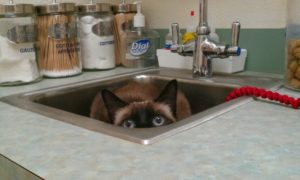
Image credit: viralcats.net
Did her vet visit reflect negligence or ignorance?
By the time I finished reading the back story my heart was broken and angry. How can a vet justify the actions taken with Princess? From a cat advocate’s perspective the outcome of her cat’s vet visit was wrong on so many levels. The sudden change of behavior hours after leaving the vet clinic were clearly adverse reactions to the vaccines. Was there negligence or simply ignorance in Princess’ case?
Princess’s behavior from spring to late summer grew increasingly worse, indicating some kind of underlying condition. Despite being shown a video of her behavior and no diagnostics performed, the vet simply said she “looked fine.” Cat parents know when something is “off” with their cats, and clearly something was wrong. Was simply recommending a flea treatment (when she didn’t have fleas and lived indoors) and getting booster vaccines–which are designed to overstimulate the immune system–the best options the vet could come up with? Did the vet even bother to review the health history or vaccine records? Do vets even recognize signs of immune confusion or understand the potential effects of toxic ingredients in the products and vaccines they use?
Helping Princess heal holistically
I tend to look at cat health with a completely different lens. Besides recognizing the potential for immune confusion and toxicity from the flea treatment and heart worm meds I also dove in to her vaccine history. In my muscle testing analysis the following showed up energetically as stressors to her body: rabies and FVRCP vaccines, aluminum, mercury, formaldehyde, Advantage and Heartguard. In addition, her body was struggling to eliminate the toxins from her body. Emotionally she was holding on to many trapped emotions: anxiety, discouragement, resentment, frustration, peeved, unsupported, and overwhelm.
My recommendations included a vaccine detox protocol that included lymphatic and liver support, immune system boosting nutraceuticals, and emotional support using CBD and the flower essence Willow. Muscle testing was able to determine all the tools her body needed to restore balance and heal. Furthermore, her symptoms of aggression, hissing, growling and attacking her tail resonated with adverse reactions to vaccines and immune system confusion going all the way back to the first time the vet diagnosed her with the herpes virus.
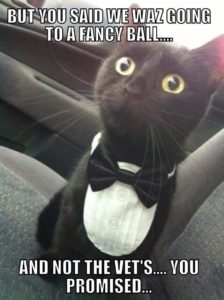
Image credit: www.iizcat.com
A better approach to your cat’s next vet visit
I want you to feel empowered with knowledge the next time you need to take your cat to the vet. First of all, keep good records and know your cat’s healthy history. When you “know” something is off with your cat’s health or behavior and the vet “can’t find anything,” here are some recommendations to keep the issue from becoming worse.
Concerning anything vaccine related
- Never vaccinate a cat that is showing signs of physical or emotional stress. Politely decline any recommendation or demand to update your cat’s vaccines at that time.
- If your cat is undergoing any kind of surgical procedure, including dental, this is not the best time to update vaccines. Their body is already under stress–let’s not add to it.
- If a vet refuses to see your cat unless you revaccinate kindly cancel your appointment and search for a new vet, preferably an integrative or holistic vet. The best time to do this research is before you need to go to the vet, not during an emergency. Search www.ahvma.org to find a holistic vet (many do remote consultations).
- Ask your vet if they are familiar with symptoms of over-vaccination and immune system confusion. Do your own research and be informed.
- Report ALL signs of adverse reactions to the FDA. Ask your vet to do the same if your cat begins to experience any health or odd behavior issues within 30 days of receiving a vaccine.
- Only give 1 vaccine at a time at least 30 days apart if you must vaccinate.
- Ask for a titer test which measures antibodies in the blood to a particular disease before you automatically revaccinate. If the vet wants to charge you a ridiculous price to do this know that Dr. John Robb, DVM, offers a more affordable service to titer test here.
- Never vaccinate a cat who is sick, has a pre-existing health condition or has had any kind of adverse reaction to a vaccine.
Concerning parasite preventatives
- Understand that flea topicals are highly toxic and further weaken the immune system with every dose. These products contain neurotoxins and other dangerous chemicals that impact the cat’s nervous and immune systems. Research the ingredients in these products so that you understand how deadly they can be.
- An indoor cat that doesn’t have fleas and is at low risk for attracting fleas or heart worms does NOT need such treatments.
- Never use these kind of preventatives or treatments on sick pets or pets with an underlying health condition.
- If you absolutely must use a treatment be sure to add a daily liver support like milk thistle.
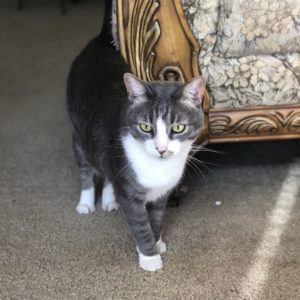
Princess
Progress reports about Princess!
Stephanie sent a couple of updates on Princess that are amazing! The first came about a week after I finished working on her.
I noticed your energy healing really worked! She still is having some growl and tail attacking outbreaks here and there but your [energy] healing significantly helped.
And then again two days later:
Today has been one of Princesses worst days, growling and swishing her tail consistently. She’s about to start the second week of the lymphatic drops, and is on CBD twice a day.
I just made the willow remedy in a 1oz spray bottle with two drops willow and the rest spring water. I sprayed two sprays on her fur about 10 minutes ago and within a couple minutes she had the zoomies and started playing with her favorite toy!She’s been such a pain tonight and that remedy really made a difference! She still has growled here and there after but that made her playful!

